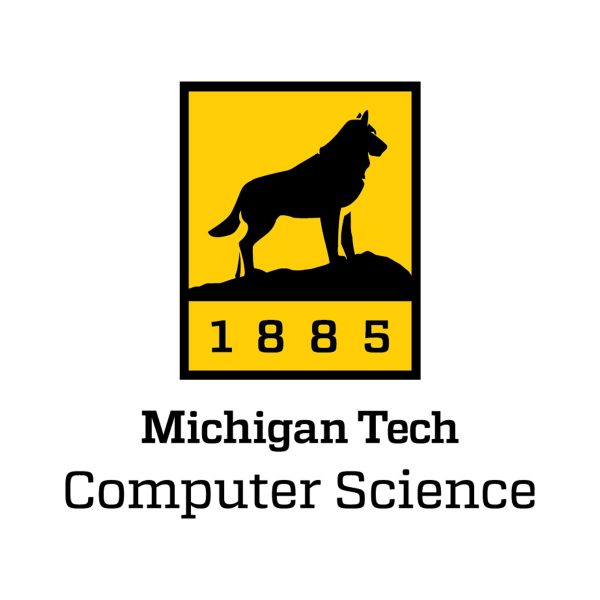
Department of Computer Science faculty and students presented two posters, a paper, and chaired a session at the 26th Annual Conference on Innovation and Technology in Computer Science Education (ITiCSE), conducted online June 26 to July 1, 2021.
“A Visualization for Teaching Integer Coercion,” a poster presented by James Walker with Steven Carr, Ahmed Radwan, Yu-Hsiang Hu, Yu Chin Cheng, Jean Mayo, and Ching-Kuang Shene, was one of three posters that received the conference’s Best Poster Award.
The poster describes the Expression Evaluation (EE) visualization tool. The tool is designed to aid students in understanding type conversions that take place implicitly in C. Understanding type conversions is essential to avoid Integer errors in C which continue to be a source of security vulnerabilities.
An additional paper and poster were presented at the conference, below. Dr. Linda Ott chaired a conference session on Students: Diversity.
Poster: Modeling the Growth and Spread of Infectious Diseases to Teach Computational Thinking by Meara Pellar-Kosbar, Dylan Gaines, Lauren Monroe, Alec Rospierski, Alexander Martin, Ben Vigna, Devin Stewart, Jared Perttunen, Calvin Voss, Robert Pastel and Leo Ureel II
The poster discusses a simulation model developed to teach middle school students about the spread of infectious diseases augmented with affordances to help students develop computational thinking skills. The simulation was partially developed as a Citizen Science project in the courses CS4760 and CS5760, User Interface Design and Human Computer Interaction.
Presentation: Frozen in the Past: When it Comes to Analogy Fears, It’s Time For Us to “Let it Go” by Briana Bettin and Linda Ott
This position paper describes a fundamental difference in attitudes toward the use of analogy in the computer science education community versus other STEM education communities. Additionally, it provides suggestions for how to address concerns in the CS education research community in order to advance research into the use of analogy in computing education
The 26th annual conference on Innovation and Technology in Computer Science Education (ITiCSE) was sponsored by ACM, the ACM Special Interest Group on Computing Education (SIGCSE), the ACM Europe Council, and Informatics Europe.
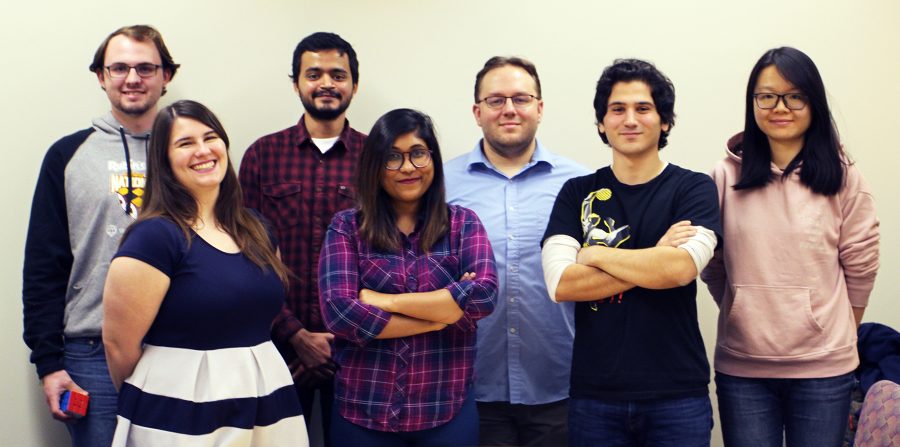
Michigan Tech 2020 Ph.D. graduate Briana Bettin, Computer Science, is among six new faculty members the College of Computing welcomed this fall. Bettin is an assistant professor for the Department of Computer Science and the Cognitive and Learning Sciences department.
This semester, she is teaching courses including CS1121 Introduction to Programming in C/C++, and pursuing research and other projects with faculty and students.
In this, Part II of this profile of Briana Bettin, Bettin and her faculty mentors talk research, education, and novel ideas.
Read the first installment of this article, ‘Briana Bettin, Asst. Prof., Part I: Neopets, HTML, Early Success Part I”, published Oct. 28, 2020, here.
Mental models, constructing knowledge, programming analogies.
Briana Bettin’s research interests are many. They include user experience, human factors, human-computer interactions, mental models, information representation, rural digital literacy, education, engagement, retention, and digital anthropology. Her Ph.D. dissertation aims to better understand how novice programmers approach learning programming, and how their construction of programming ideas might be better facilitated.
“I delve into mental models research and explore theories for how students might construct knowledge,” she explains. “Specifically, the major studies in my dissertation explore how prior applicable knowledge might allow for transfer to programming concepts, which can feel very novel to students who have never programmed before.”
Bettin is also exploring methods for designing programming analogies, testing their application in the classroom, and observing how their use may impact student understanding of specific topics. “I take a very user experience-oriented approach, and work to apply methods and ideas from user-experience research in the CS classroom space,” she says.
Creative energy, insight, and humanity.
With Computer Science department faculty members Associate Professor Charles Wallace and Assistant Professor Leo Ureel, Bettin has worked on projects studying how novice programmers communicate. She and Ureel also worked on several ideas in the introductory CS classrooms, including exploring pair programming obstacles in the classroom and in research.
“I got to know Dr. Wallace during my Ph.D., and I love getting his perspective on research ideas,” Bettin says. “He has so many interesting ideas, and he’s so fun to talk to!”
“Briana brings loads of creative energy, insight, and humanity to everything she does,” says Wallace. “We are very fortunate to have her with us.”
Passionate about Computing Education.
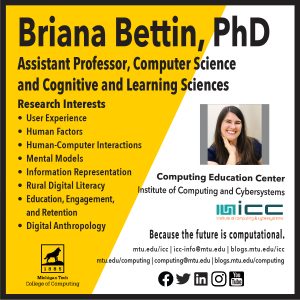
Other research collaborators include Lecturer Nathan Manser, Geological and Mining Engineering and Sciences, and Senior Lecturer Michelle Jarvie-Eggart, Engineering Fundamentals, College of Engineering, with whom Bettin has explored topics in technology acceptance across engineering and computer science.
“Briana has been an enthusiastic addition to our research group,” Jarvie-Eggart says, who is working with Steelman and Wallace on improving engineering students’ acceptance of programming. “She really is amazing!”
Jarvie-Eggart sat in on Bettin’s Intro to Programming class in fall 2019, and noted that Bettin’s. approach of teaching algorithmic thinking and logic—before students begin programming—helps make programming more accessible to all.
“It builds foundational knowledge from the ground up,” she says. “Our research team is very excited about using her progressive CS education approaches to teach engineers programming.”
“Stefka Hristova, in Michigan Tech Humanities, has always been supportive, helping me cultivate an interdisciplinary research vision and voice,” Bettin says. “Dr. Robert Pastel has also been so valuable in helping me approach my research with strong design. He has given me a lot of insight and I am so appreciative!”
“Briana is passionate about Computing Education, and she is invested in infusing equity and diversity into the STEM field,” Hristova says.
In Part III of this article, to be published soon, Briana Bettin talks about peer mentors and friends … and they say a few words, too.
Read the first installment of this article, ‘Briana Bettin, Asst. Prof., Part I: Neopets, HTML, Early Success Part I”, here.
Briana Bettin, Ph.D., Computer Science: New Degree, New Position
By Karen S. Johnson, Communications Director, College of Computing
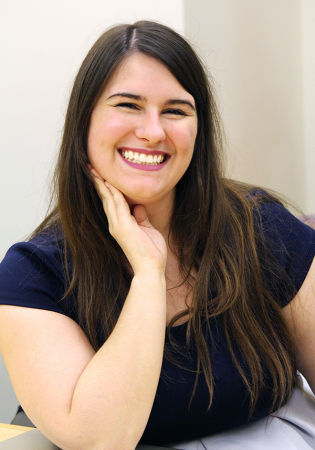
Michigan Tech Ph.D. graduate Briana Bettin, Computer Science, is among six new faculty members the College of Computing welcomed this fall. Bettin is an assistant professor for the Department of Computer Science, and an affiliated assistant professor for the Cognitive and Learning Sciences department.
She is teaching courses including CS1121 Introduction to Programming in C/C++, and pursuing research and other projects with faculty and students.
In August 2020, Bettin successfully defended her dissertation, “The Stained Glass of Knowledge: On Understanding Novice Mental Models of Computing,” and was awarded her Ph.D. in Computer Science.
“I’m excited to begin my faculty journey at Michigan Tech and I look forward to helping our students continue to learn skills that will allow them to create the future,” Bettin says. “Michigan Tech has always been an amazing place for me—the opportunity to continue to give back to this place that has given me so much is something I’m very grateful for.”
Bettin says that she is excited about several interesting research projects already being planned, and she looks forward to helping the College advance its educational and research visibility and standing.
Bettin is a member researcher of the Institute of Computing and Cybersystems’ new Center for Computing Education, which promotes research and learning activities related to computing education.
Neopets, HTML, CSS. Here’s how Briana Bettin got everything started.
Video games caught Bettin’s interest at a young age and as she grew older, she became interested in online games like Neopets, which allows the user to develop a profile using HTML.
“So, I became excited to learn about HTML and CSS in order to express myself in those online spaces,” she says. “This also got me interested in graphic design, and both of these things combined got me hooked on the idea of creating expressive virtual spaces.”
Bettin earned her Bachelor of Science in Computer Science, with an Application Area in User Experience and Marketing, from Michigan Tech in spring 2014. Following, while working full time as a front-end web developer at a consulting firm, in summer 2016 she completed her master’s degree online. In fall 2016, Bettin began her Ph.D. studies.
The right fit.
“I wasn’t always sure if Computer Science was ‘right’ for someone like me,” Bettin reflects. “But my Ph.D. advisor, Dr. Linda Ott, would encourage me by reminding me of the vast opportunities in technology. And since I became aware of the interdisciplinary area of User Experience, my interest in programming has only grown!”
“Dr. Ott is absolutely amazing,” Bettin says of Professor Linda Ott, chair of the Department of Computer Science. “I am thankful for her, and I knew that having her as my adviser would be one of the best things I could hope for. Our working styles are very complementary, and she is a great motivator and supporter. Laura Brown and Nilufer Onder have also been great mentors, offering me wonderful advice and support whenever I talk to them.”
Bettin adds that Assistant Professor Leo Ureel, Computer Science, was “wonderful in helping me develop my research vision. We often bounce ideas, and he has supported my ideas and given me many opportunities to implement research ideas in the classroom. Our talks give me so much perspective and energy.”
Early teaching success, fellowships, and awards.
Bettin was a CS 1121 lab instructor from fall 2016 until fall 2019, when she became the instructor of record, teaching her first semesters as a lecturer in fall 2019 and spring 2020. That fall, she received outstanding “Average of 7 Dimensions” student evaluation scores, one of only 74 such accolades earned by faculty that semester.
But Bettin’s excellence was recognized long before, in fall 2017, when she received the Outstanding Graduate Teaching Assistant award from Michigan Tech’s Graduate Student Government.
Bettin was awarded the King-Chavez-Parks Future Faculty Fellowship from the State of Michigan in fall 2018. She received several doctoral consortium stipends from organizations including Institute for Clinical and Economic Review (ICER), the Frontiers in Education Doctoral Symposium (FIE), and the Computing Research Association’s Committee on the Status of Women in Computing Research (CRA-W).
A Google Scholar award made it possible for her to attend the 2017 Grace Hopper Celebration, which supports women in computing and organizations that view technology innovation as a strategic imperative. In fall 2019, Bettin was nominated for the prestigious MAGS Teaching Award.
Part II of this article will be published soon. In the second installment we’ll learn about Briana’s teaching and research, and the faculty and peer mentors who supported her as she completed her Ph.D.
The Michigan Tech College of Computing welcomed six new faculty members this fall to the Departments of Applied Computing and Computer Science.
College off Computing Dean Adrienne Minerick says the new hires reflect the fast growth of the new College, which was launched July 1, 2019.
“We are thrilled to welcome these six talented new faculty members,” Minerick says. “Even amid the challenges we are all facing, our proactive recruitment and retention activities are making a difference.”

Assistant Professor Briana Bettin, Computer Science, has a Ph.D. in computer science from Michigan Tech. She is also an affiliated assistant professor for the Cognitive and Learning Sciences department. Bettin’s research interests include user experience; human factors; human-computer interactions; mental models; information representation; rural digital literacy; education, engagement, and retention; and digital anthropology. Bettin is a member of the ICC’s Computing Education Center.
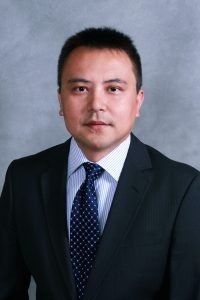
Assistant Professor Sidike Paheding, Applied Computing, has a Ph.D. in electrical engineering from University of Dayton, Ohio. Prior to joining Michigan Tech Paheding was a visiting assistant professor at Purdue University Northwest. His research interests include image/video processing, machine learning, deep learning, computer vision, and remote sensing. Paheding is a member of the ICC’s Center for Data Sciences.
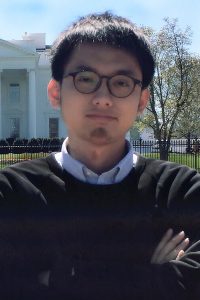
Assistant Professor Junqiao Qiu, Computer Science, has a Ph.D. in computer science and engineering from University of California Riverside. His research focuses on parallel computing, programming systems, and compiler optimization. Qiu is a member of the ICC’s Center for Scalable Architectures and Systems.
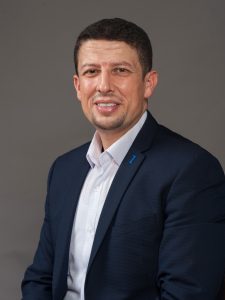
Assistant Professor Ashraf Saleem, Applied Computing, has a Ph.D. in mechatronics engineering from DeMontfort University, UK. He comes to Michigan Tech from the electrical and computer engineering department at Sultan Qaboos University, where he served the mechatronics engineering program. Ashraf will be on campus starting in the spring 2021 semester.
Saleem’s research interests are in autonomous systems, vision-based unmanned vehicles, Artificial Intelligence, control of Piezoelectric actuator, and servo-pneumatic systems.

Assistant Professor Leo Ureel, Computer Science, has a Ph.D. in computer science from Michigan Tech. He has been teaching at the college level for 10 years, and has over 20 years of industry experience. Ureel is also coordinator of the College of Computing Learning Center. Ureel is a member of the ICC’s Computing Education Center.
Ureel’s research focuses on a constructionist approach to introductory computer science that leverages code critiquers to motivate students to learn computer programming. His areas of expertise include software engineering, computer science education, and intelligent tutoring systems.

Assistant Professor Brian Yuan, Applied Computing and Computer Science, has a Ph.D. in computer science from University of Florida. His areas of expertise include machine learning, security and privacy, and cloud computing. Yuan is a member of the ICC’s Center for Cybersecurity and Center for Data Sciences.

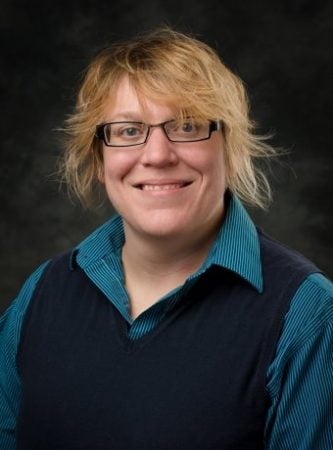
Kelly Steelman, interim department chair and associate professor, Cognitive and Learning Sciences, presented her paper, “Work in Progress: Student Perception of Computer Programming Within Engineering Education: An Investigation of Attitudes, Beliefs, and Behaviors” at the 2020 ASEE Virtual Conference, June 22-26, 2020.
Co-authors of the paper are Michelle Jarvie-Eggart (EF), Kay Tislar (CLS), Charles Wallace (CC), Nathan Naser (GMES), Briana Bettin (CS) and Leo Ureel (CS), all from Michigan Tech.
Abstract
Although most engineering faculty and professionals view computer programming as an essential part of an undergraduate engineering curriculum, engineering students do not always share this viewpoint. In fact, engineering students—especially those outside of computer and electrical engineering—may not realize the value of computer programming skills until after they have graduated and advanced in their career (Sterian, Dunne, & Blauch, 2005). Failure to find value in computer programming may have negative consequences for learning. Indeed, engineering students who do not view programming as interesting or useful show poorer performance on tests of programming concepts than students who do (Lingar, Williams, and McCord, 2017). This finding is consistent with theories of technology acceptance (e.g., Davis, 1989, Venkatesh, et al., 2003) that emphasize perceived usefulness as a key determinant of attitudes toward a technology and subsequent use or disuse of it. Accordingly, to better support student learning, engineering coursework should include specific interventions that emphasize the utility of programming skills for a career in engineering. Intervention effectiveness, however, may depend in part on the characteristics of the individual learners, including their prior programming experience, their openness to new experiences, and their beliefs about the nature of intelligence. The purpose of the current work is to understand engineering students’ attitudes toward and experiences with computer programming as well as to assess the relationship between their attitudes and experiences and their mindset toward their own intelligence. 101 engineering students participated in the study as part of a general education psychology course. Participants completed a computer language inventory and three surveys. The first survey inquired about students’ computer programming experiences and attitudes (Hoegh and Moskal, 2009). The second survey posed questions related to different aspects of openness to experience (Woo et al., 2014): intellectual efficiency, ingenuity, curiosity, aesthetics, tolerance, and depth. Finally, the third survey probed participants’ beliefs about the nature of intelligence and whether it is fixed or can be developed (Dweck, 1999). This paper will present the results of these surveys and explore the correlations among the various scales. The implications for engineering education interventions will be discussed.
Download the paper here.
Citation
Steelman, K. S., & Jarvie-Eggart, M. E., & Tislar, K. L., & Wallace, C., & Manser, N. D., & Bettin, B. C., & Ureel, L. C. (2020, June), Work in Progress: Student Perception of Computer Programming within Engineering Education: An Investigation of Attitudes, Beliefs, and Behaviors Paper presented at 2020 ASEE Virtual Annual Conference Content Access, Virtual On line . https://peer.asee.org/35683